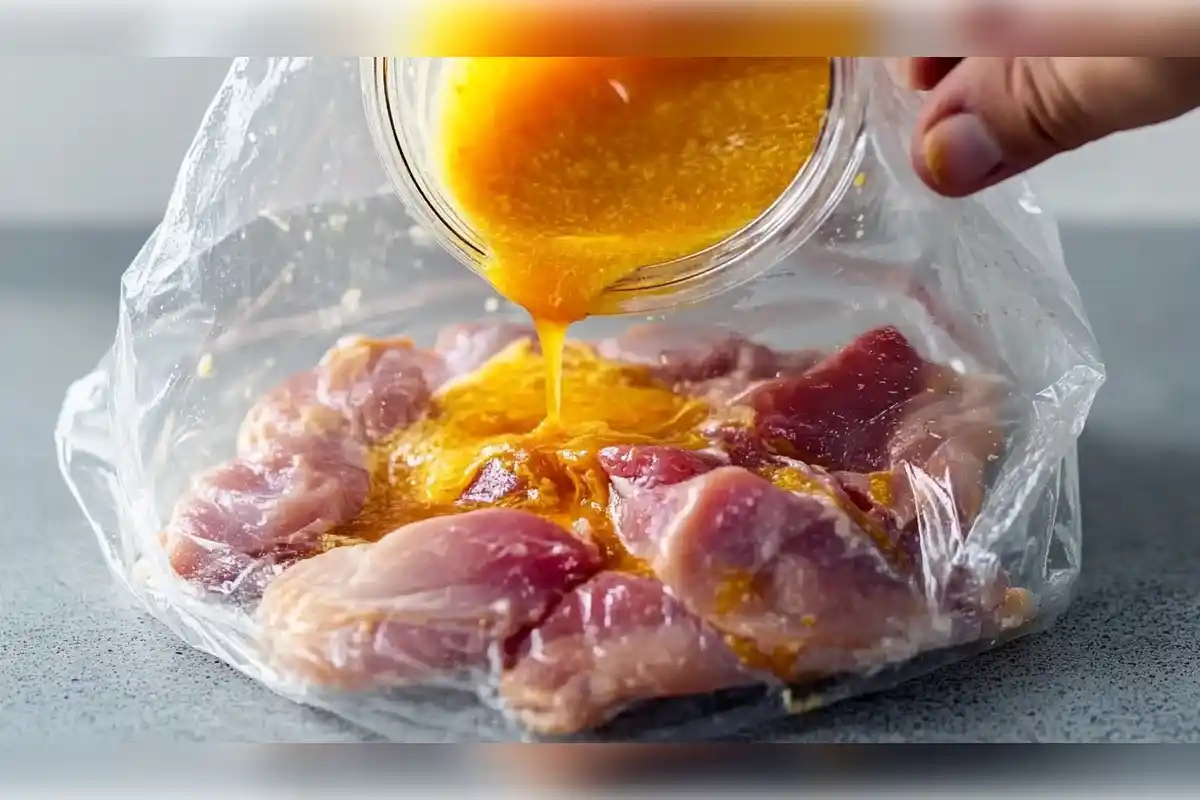If you’ve ever wondered, Does pineapple juice tenderize chicken?, you’re not alone. This popular kitchen trick has been a staple in marinades for years, but how effective is it?
Why Pineapple Juice Tenderizes Chicken
The secret behind pineapple juice’s tenderizing power is a natural enzyme called bromelain. This enzyme breaks down the proteins in meat, which softens the chicken and makes it more tender. When applied to chicken, bromelain essentially begins to “pre-digest” the protein fibers, making them less tough and easier to chew after cooking.
How Bromelain Works
Bromelain is primarily found in fresh pineapple, especially in the core. When you marinate chicken in pineapple juice, the bromelain begins to break down the muscle fibers, resulting in tender, juicy meat. However, there’s a delicate balance – leave the chicken in pineapple juice too long, and the texture can become overly soft, even mushy.
If you’re aiming for perfectly tender chicken, a marinade containing fresh pineapple juice should only be applied for a short time (more on this below).
How Long Should You Marinate Chicken in Pineapple Juice?
When it comes to marinating chicken in pineapple juice, timing is crucial. The general recommendation is to marinate chicken for no more than 30 minutes to 2 hours. Any longer than this, and the bromelain can break down the chicken too much, giving it a texture that’s far from appetizing.
Over-Marinating Chicken
One common mistake is marinating chicken in pineapple juice for too long. Over time, the bromelain enzyme can break down too many of the proteins, leaving you with a chicken that has an undesirable mushy texture. The key is to find the right balance of tenderness without compromising texture.
Pro Tip: If you’re unsure about the timing, start with a 30-minute marinade and see how it affects the texture. You can always adjust the marination time for future recipes.
Fresh vs. Canned Pineapple Juice: Does It Matter?
Not all pineapple juice is created equal when it comes to tenderizing chicken. Fresh pineapple juice contains active bromelain, which is responsible for breaking down proteins. On the other hand, canned or pasteurized pineapple juice has typically been heated, which deactivates the bromelain.
When to Use Fresh Pineapple Juice
If your goal is to tenderize the chicken, fresh pineapple juice is the way to go. The active enzymes will help achieve that tender texture you’re looking for. Fresh juice from the core of the pineapple contains the highest concentration of bromelain.
When to Use Canned Pineapple Juice
Canned pineapple juice still works well in marinades if you’re primarily after flavor rather than texture. Since the enzyme has been deactivated in the heating process, canned juice won’t have the same tenderizing effect. Use canned juice if you want the tangy, sweet flavor of pineapple without worrying about over-tenderizing the chicken.
How to Use Pineapple Juice to Tenderize Chicken: A Step-by-Step Guide
Here’s how to marinate your chicken using pineapple juice to get perfectly tender meat every time:
Ingredients for Pineapple Chicken Marinade:
- 1 cup of fresh pineapple juice
- 2 tablespoons of soy sauce
- 1 tablespoon of olive oil
- 2 cloves of garlic, minced
- Salt and pepper to taste
Step-by-Step Instructions:
- Prepare the Marinade: In a bowl, mix together the pineapple juice, soy sauce, olive oil, minced garlic, salt, and pepper.
- Marinate the Chicken: Place your chicken in a shallow dish or zip-lock bag. Pour the marinade over the chicken, making sure all pieces are coated.
- Timing is Key: Let the chicken sit in the marinade for no more than 30 minutes to 2 hours. Be careful not to exceed this time to avoid over-tenderizing the meat.
- Cook the Chicken: After marinating, cook the chicken using your preferred method. Grilling or baking works best to retain the moisture and flavor.
Common Mistakes to Avoid
When working with pineapple juice as a tenderizer, there are a few common pitfalls that can affect your results.
1. Over-Tenderizing
As mentioned earlier, letting your chicken marinate for too long in pineapple juice will result in a mushy texture. It’s better to err on the side of caution and stick to the recommended marination time.
2. Not Balancing the Marinade
While pineapple juice is a fantastic tenderizer, it’s also very acidic. If you use too much pineapple juice without balancing it with other ingredients (like oil or soy sauce), you might end up with chicken that’s too tangy or unevenly tender.
3. Using Canned Pineapple Juice When Tenderizing is the Goal
Remember that canned pineapple juice won’t have the same tenderizing effect because the bromelain enzyme has been deactivated. Always use fresh juice for tenderizing purposes.
Alternatives to Pineapple Juice for Tenderizing Chicken
If you don’t have pineapple juice on hand or are looking for other options, several natural alternatives can help you achieve the same tenderizing effect.
1. Papaya (Papain Enzyme)
Papaya contains an enzyme known as papain, which functions similarly to bromelain found in pineapple. This enzyme works effectively to break down the proteins in meat, making it a great alternative for tenderizing chicken. You can use papaya puree or juice in marinades for a similar result.
2. Kiwi (Actinidin Enzyme)
Kiwi is another fruit that contains an enzyme capable of tenderizing meat, called actinidin. Like bromelain, actinidin breaks down proteins, but it’s less aggressive, making it a good choice for delicate meat cuts. Kiwi juice or puree can be added to your marinades for a mild tenderizing effect.
3. Yogurt or Buttermilk
These dairy-based alternatives are rich in lactic acid, which works more slowly than fruit enzymes but is great for tenderizing and adding flavor. Marinating chicken in yogurt or buttermilk is a popular method in many cuisines, such as Indian tandoori or Southern-style fried chicken.
4. Vinegar or Lemon Juice
Acidic marinades using vinegar or lemon juice are another effective way to tenderize chicken. While they don’t break down proteins in the same way as enzymes, their acidity helps soften the meat. Be cautious not to marinate for too long, as these acids can also cause the chicken to become tough.
Related Recipe: For a flavorful twist, try this Pineapple Teriyaki Chicken Recipe, which balances the sweetness of pineapple with the umami of soy sauce. It’s a perfect companion for any BBQ or dinner party!
FAQs
Here are some of the most common questions people have when it comes to using pineapple juice to tenderize chicken, pulled directly from the People Also Ask section of Google.
1. Does pineapple juice make meat mushy?
Yes, pineapple juice can make meat mushy if the chicken is left in the marinade for too long. The bromelain enzyme breaks down proteins rapidly, so it’s important to limit the marination time to between 30 minutes and 2 hours. Any longer, and the chicken’s texture may become overly soft or “mealy.”
2. How long can you leave chicken in pineapple juice?
The recommended marination time is no more than 30 minutes to 2 hours. Longer marination times can lead to undesirable texture changes, as the enzyme continues to break down proteins.
3. Can you use pineapple juice for other meats?
Absolutely! Pineapple juice works well with other meats, particularly tougher cuts like beef or pork. The bromelain in pineapple juice is effective at breaking down the proteins in tougher meats, making them more tender. Just be mindful of the marination time, as the enzyme works quickly.
4. What part of the pineapple is best for tenderizing?
The core of the pineapple contains the highest concentration of bromelain, making it the most effective part of the fruit for tenderizing. When using fresh pineapple, try to include some of the juice from the core for maximum impact.
5. What happens if you leave chicken in pineapple juice overnight?
Leaving chicken in pineapple juice overnight is generally not recommended. The enzyme activity from the bromelain would break down the chicken too much, leaving it mushy. Stick to short marination times to avoid ruining the texture of the meat.
Does Pineapple Juice Change the Flavor of Chicken?
Yes, pineapple juice does more than just tenderize – it also imparts a sweet and tangy flavor to the chicken. When used in moderation, pineapple juice adds a refreshing, tropical note to marinades that pairs well with savory ingredients like soy sauce, garlic, and ginger. If you’re looking for balance, consider combining pineapple juice with other flavors to avoid an overly sweet profile.
Balancing Sweetness and Acidity
While pineapple juice is naturally sweet, it also has a mild acidity that can enhance the flavor of the chicken. However, it’s important to balance the sweetness with other marinade ingredients. Here are a few tips to achieve the perfect balance:
- Add soy sauce or Worcestershire sauce to introduce a salty, umami note.
- Include chili flakes or sriracha for some heat.
- Use olive oil or sesame oil to add richness and balance the acidity.
How Bromelain Works to Tenderize Chicken: The Process Explained
We’ve already mentioned that bromelain is the enzyme responsible for breaking down proteins in chicken. But how exactly does it work on a molecular level?
How Enzymes Affect Meat
Proteins in meat are made of long chains of amino acids, which give meat its structure and firmness. Bromelain acts by cleaving the peptide bonds in these proteins, essentially “snipping” the amino acids apart. This softens the muscle fibers, making the chicken easier to chew and digest.
Is Bromelain Better than Other Tenderizers?
Compared to other enzymes like papain (from papaya) or actinidin (from kiwi), bromelain is considered one of the more aggressive meat tenderizers. This is why pineapple juice should be used sparingly and for short durations, especially with delicate meats like chicken. For tougher cuts of beef or pork, bromelain can be a great choice for longer marination times.
Recipes Featuring Pineapple Juice as a Tenderizer
Now that you know how pineapple juice works as a tenderizer, why not try a few recipes? Here are two delicious options that use pineapple juice to both flavor and tenderize the chicken:
Grilled Pineapple Chicken Recipe
- Ingredients: Fresh pineapple juice, soy sauce, brown sugar, garlic, ginger, and chicken breasts.
- Method: Combine all the ingredients to make a marinade, let the chicken sit for 1 hour, and grill it to perfection. The result is a juicy, tender chicken with a sweet and savory glaze.
Pineapple-Glazed Chicken Stir-Fry
- Ingredients: Pineapple juice, soy sauce, honey, bell peppers, onions, and chicken thighs.
- Method: Stir-fry the chicken with vegetables and glaze it with a mixture of pineapple juice and honey for a quick and tasty dinner. The tender chicken will absorb the sweet, tangy sauce, creating a balanced dish that’s perfect for weeknights.
Conclusion
Using pineapple juice to tenderize chicken is a tried-and-true method, but it requires careful timing and balance. The bromelain enzyme breaks down proteins, resulting in tender meat, but it can also lead to mushiness if not used properly. Whether you’re using fresh or canned pineapple juice, understanding the science behind the process will help you avoid common mistakes and elevate your cooking.
By incorporating pineapple juice into your marinades, you can achieve flavorful, tender chicken dishes that are sure to impress. Just remember to keep an eye on the marination time and pair pineapple juice with complementary ingredients for the best results.

